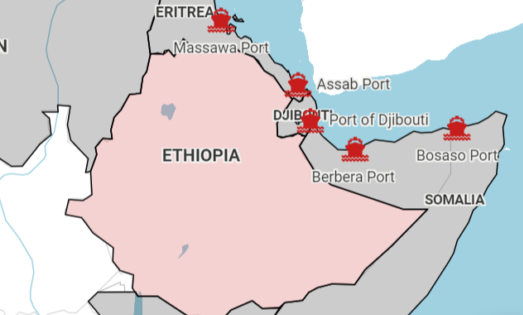The Ethiopia-Somaliland Berbera Port Deal: A New Horn of Africa (1-2)

Agencies – Sudan Events
On January 1, 2024, Ethiopia signed a Memorandum of Understanding (MoU) with Somaliland, giving Addis Ababa access to the Berbera Port on the Red Sea. In exchange, Addis Ababa was to recognize the state, which has self-proclaimed its independence officially. Somaliland was part of Somalia from 1960 to 1991. This paper deals with the background, stakes, and implications of this initial maritime agreement on the regional situation in the Horn of Africa.
Since Eritrea’s independence from Ethiopia in 1993, the latter lost its access to the Red Sea and became landlocked. Addis Ababa tried to compensate for this situation through initiatives and measures, notably building several roads and railways with neighbouring countries such as Kenya, Djibouti, and Eritrea. Ethiopia has depended on Djibouti’s port for its exports (95 percent) and imports (85 percent) in exchange for US$ 1.5-2 billion annually. Moreover, Djibouti gained some stakes in large Ethiopian companies such as Ethiopian Airlines and Ethio Telecom.
However, Addis Ababa believes its vital interests in the Red Sea require diversifying its maritime access. To this end, Ethiopia took a 19 percent share in the Berbera Port in Somaliland. However, in June 2022, the Hargeisa government announced that Ethiopia had lost its stake in the port because it had failed to “fulfil the required conditions to complete the ownership deal.” The issue concerns Ethiopia’s pledge to build a 260-kilometer road connecting the Berbera Port to Ethiopian territories.
In a lengthy speech in November 2023, Ethiopian Prime Minster Abiy Ahmed said that access to the Red Sea is an existential concern for Ethiopia. Ahmed underscored that “a population of 150 million cannot live in a geographic prison.” The Ethiopian prime minister pledged not to use military power against his neighbours to have access to the sea. However, his speech has raised controversy and fears in the region.
Therefore, the recent MoU between Ethiopia and Somaliland is part of Addis Ababa’s constant ambition to expand in the Red Sea region to control the geopolitical balances in the Horn of Africa region. This expansion – along with the Renaissance Dam – will form the axis of Ethiopia’s power in the future.
The precise details of the MoU between the Ethiopian and Somaliland governments are still unknown. However, leaks have revealed the following essential elements:
• Ethiopia proposes the utilization of a 20-kilometer stretch of the Red Sea shoreline in the waters of Somaliland near the Berbera Port on the Gulf of Aden for 50 years.
• There is consideration for establishing an Ethiopian naval military base in the Berbera Port area.
• Additionally, there is consideration for establishing an Ethiopian trade zone in the Berbera Port area.
In exchange, the Ethiopian government has committed to reassessing its diplomatic relations with the Republic of Somaliland. In diplomatic terms, this commitment implies a willingness to recognize Somaliland’s independence and sovereignty, a state that lacks international recognition despite seceding from the Republic of Somalia. Ethiopia has also pledged once again to allocate shares in Ethiopian Airlines to the Government of Somaliland.



